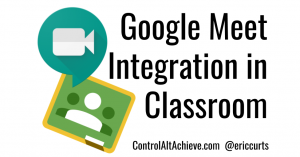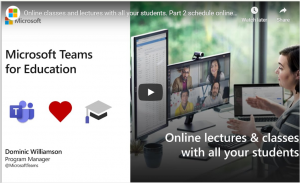Schools are infamous for slow change. Yes, most schools have made more change in just weeks than they made in years. Of course there were mistakes, gaps, failures, and challenges….but there were also surprises, problems solved, advances, and tremendous successes.
 What we experienced from March – June was(is) not necessarily what school is going to be long term. However, technology allowed us, in many areas, to continue some level of learning despite a deadly virus all around us. This would simply not have been possible 10 years ago. Yes, there were some areas where connection and technology was limited, but that was also the case before this all happened. In many cases, teachers were able to provide that vital and needed connection with school. I am not talking about teaching Shakespeare, Boolean variables, causes of the War of 1812, or Pythagorean theorem; I am referring to that idea that education—for many students— is part of the path to their future. It is one of the places where students learn the skills to become active contributors to society. Teachers providing that connection with school, without knowing it, were helping keep that dream alive. That is what we experienced from March – June.
What we experienced from March – June was(is) not necessarily what school is going to be long term. However, technology allowed us, in many areas, to continue some level of learning despite a deadly virus all around us. This would simply not have been possible 10 years ago. Yes, there were some areas where connection and technology was limited, but that was also the case before this all happened. In many cases, teachers were able to provide that vital and needed connection with school. I am not talking about teaching Shakespeare, Boolean variables, causes of the War of 1812, or Pythagorean theorem; I am referring to that idea that education—for many students— is part of the path to their future. It is one of the places where students learn the skills to become active contributors to society. Teachers providing that connection with school, without knowing it, were helping keep that dream alive. That is what we experienced from March – June.
Tough times like this do not necessary create new types of learning, but instead simply take what was already there and amplify it. What that means is teachers that were at least willing to try , think out of the box, and be thoughtful were able to make much more progress than they ever imagined. Schools that were proactive were able to provide learning when many thought not possible. Educators did not simply throw up their hands. Instead, quite the opposite– it was all hands on deck. Teachers in all grade levels found that regardless of their level of comfort with technology….online learning and project-based environments were in fact able to enable them to offer authentic learning experiences. And if you asked these teachers what they would do different or better next time, they already have new ideas in mind. Most of the teachers I talk with already have numerous nuggets to take back to their face-to-face classroom as well. Many are ready for(or at least expecting) what will come next.
 That is why the fall semester need not be something we are afraid of, but instead excited about. Will it be different? Yes. Will it be like school in the past? No. Will there be failures? Absolutely. Will there be huge wins? Without question. Will we have to make adjustments on the fly? Yep. Will it be easy? No. But education has never been easy.
That is why the fall semester need not be something we are afraid of, but instead excited about. Will it be different? Yes. Will it be like school in the past? No. Will there be failures? Absolutely. Will there be huge wins? Without question. Will we have to make adjustments on the fly? Yep. Will it be easy? No. But education has never been easy.
As I said before, times like these amplify what was already happening, but instead of spending a year transitioning into a new pedagogy or trying out a new project idea, we are doing it in weeks or even days.
Why is this working? Mainly because students are resilient, flexible and adaptable. Educators who are willing to be open minded have also been resilient, flexible and adaptable. Schools that charge tuition, including higher education and private education, have no choice in the matter; they must adjust their value propositions (read my thoughts on this vital realization) to justify the dollars coming in. Those schools that do not adjust will not survive. This is nothing new…these crazy times have simply sped up the process.
What am I excited about in the coming “future” (which has already arrived) of learning?
Higher education will have to change how they sell college life. Parents and students over the last decade who went on admission tours were given glimpses of rock climbing walls, new construction, football stadiums, dorm rooms, and Greek life housing. Little was discussed about the academics. Yet now with a limited campus, the academics are all that they have. And isn’t that what college is supposed to about anyway? The pursuit of learning?
Interactive learning is the new norm. Projects, problems, hands-on activities have taken the place of worksheets, multiple choice tests, and even exams. How we spend our time when we are physically or virtually with students has changed dramatically. What we want students doing with the limited time we are allotted out of class has also changed. Lecture simply does not work in virtual learning.
We are learning that testing is not the only way to evaluate learning.
The time table of learning is finally a discussion we can have. 7 periods a day for 5 days a week is incredibly not conducive to good learning.
The traditional schedule of school running from August – June is also a discussion we can have. Is our current model the best model to take advantage of the world, as it will be the next couple of years?
Doing the even problems at the end of the chapter style of homework is dead. Using homework as real tool outside of class…as opposed to busy work is what has replaced it.
What is considered a core class is now not clearly defined. This is a good thing. Students are demanding that classes like art, music, and physical education are a regular part of their virtual day. These are the classes that offer a complete different experience than traditional core subjects. They provide a needed change of pace, while being incredibly valuable in ways that traditional “academic” classes cannot be. Are we finally realizing that these classes are possibly even more valuable during times like these. Mental and physical health are far more important than solving for x.
High school graduation requirements in high schools are finally on the table for discussion
College admission requirements and the admissions process itself is finally changing.
Standardized testing is finally not a top priority in schools. This may be the best news of all. Standardized testing, in the way that we do it and use it, drains the life out of our schools.
We are finally transitioning from occasionally incorporating technology in the classroom…to technology just being a natural tool that allows us to interact with students and student to interact with subject material.
The place of traditional textbooks in education is finally a topic for discussion
Digital portfolios, presentations, and artifacts are being used as a legitimate tools to document learning. This is an indicator that we are looking to demonstration of learning as opposed to regurgitation of content.
One of the side dishes of silver that is also coming along with this craziness is that parents are now having an appreciation and understanding of school, learning, and teaching….in ways they never have before. The fact that ‘it takes a village’ is now more true than ever.
We are reevaluating what grading means…and where and how it fits into learning.
Innovation, exploration, and experimentation have become required skills in successful teaching.
So, while there are many unknowns in the coming months for all of us in education, this is not necessarily a negative. After all, isn’t learning itself just helping people learn about unknowns?

